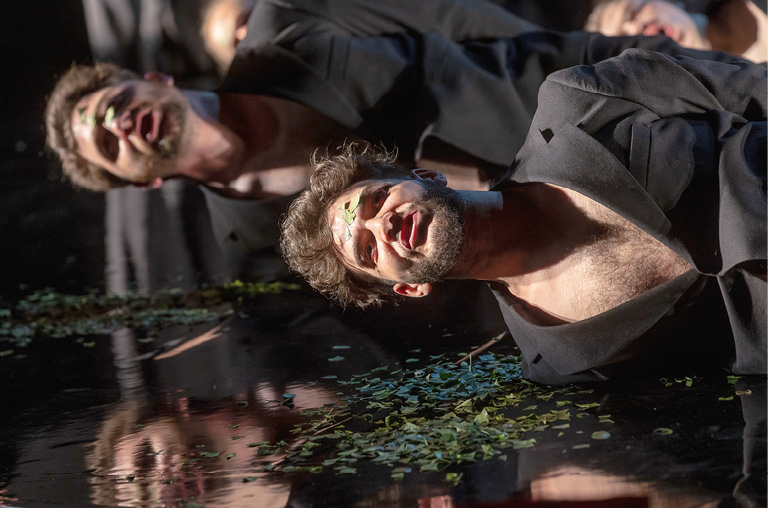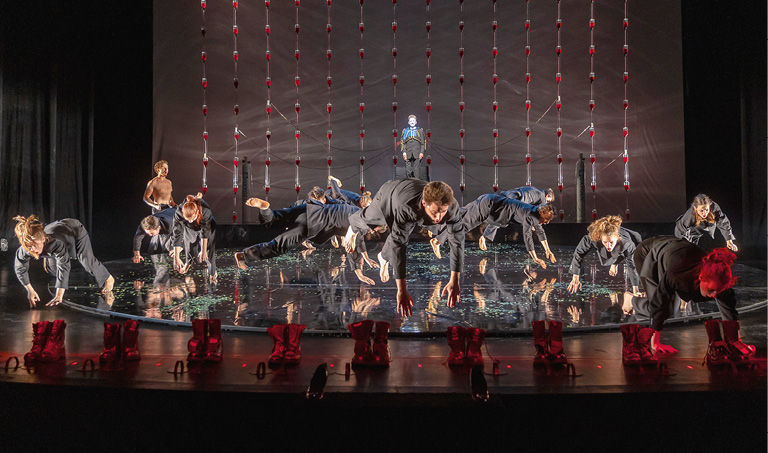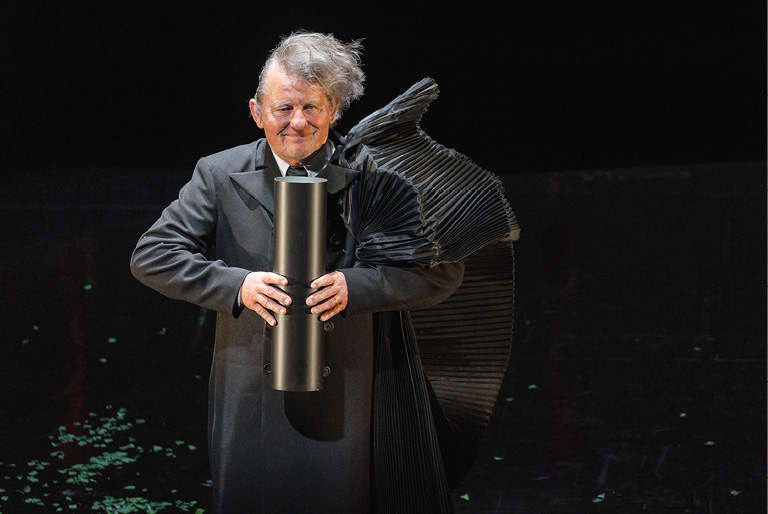To describe how the world might have felt in Antiquity is always a daring venture, or even an impossible one. In the field of the Ontology of Art, historical research on ideas and beliefs would lead us to think that it was not very long ago when the sun itself was considered a type of deity (Eliade 1994, 81), yet the problem rather stems from the fact that today the world appears considerably bleaker than it did in Antiquity. The mythical unity between Man and nature has been severed, being has become unbalanced and we can understand joy and suffering, and even renewal and death, only in terms of details. When scrutinising Ancient Greek dramas, one thing must be borne in mind: the original meaning of the text can only be reconstructed at a certain level of probability, and all serious critics agree that a text can assume new meanings as circumstances change. New interpretations of the dramas of Euripides, particularly The Bacchae, appear frequently.

Figure 1. The ecstatic moment of the Choir – beyond the limits of linear perception of space and time. Photo: Zsolt Eöri Szabó
Theodoros Terzopoulos recognised that dramatic tension does not only concern the soul but also the body. A multiperspective interpretation of the human condition implies that besides their spiritual nature, forebodings of tragedy also have an innate physical character. As the world famous director explained in his study The return of Dionysus: “His [the actor’s] body, open to inner and outer stimuli, changing constantly, balances on a tightrope between life and death” (Terzopoulos 2019). Whoever recognises this can therefore approach Greek theatre from the aspect of the body. For no matter how we may have lost the feeling of Antiquity, it is the body that is the most universally conscious, as the belief in the life of our cells, the survival instinct, is universal, akin to the will to live that is present in all other bodies. This certainly merits further attention, if we are to deconstruct Terzopoulos’s works.
When a person’s blood becomes too hot, their throat is suddenly gripped by the moment when they can only growl and feel that if they do not unleash the animal suddenly that is awakened within them, they may perhaps not even remain the being that they were born to be, and may easily fall into a state of primal barbarism. It is also beyond doubt that Man’s ecstatic state when “he is beside himself” opens to him the purity of life lost, and an elusive beam of life from the whirl of time thawing the ego nearly leads him back to where he was expelled from and shines on the gates of Eden. What is this? Divination? Animalisation? Divine frenzy or ungainly madness? Or something altogether different? Who actually is Homo sapiens, if superheated blood flooding his heart, liver, and brain makes him capable of enkindling the most immense horrors?
Staging Euripides’s drama The Bacchae, with a method of work that was to mature into an inter-cultural form of drama, was the first attempt by the Greek director with a penchant for transformative solutions to present the anthropological atmosphere of Ancient Greek theatre. Thanks to the efforts of Attila Vidnyánszky, this attempt has now become visible on the Hungarian stage, performed by Hungarian actors and actresses. The performance has not started, yet in this interpretation of Terzopoulos we are already partaking of something that can only be provided by the theatre and nothing else, in which the stage is a border zone, that of being and human existence, which is where struggle for life, the natural fight for life or death, first whirls and then assumes an action-driven form.
The ominous opening scene, as Cadmus lies surrounded by a jumble of transfusion tubes on a black throne that could well pass for a catafalque, might correspond to a mythical portrait of modern Man and the viewer may, following the scene’s meditative start, even come to imagine that it is he or she who is lying in the middle of the stage, the one who could be revived by another person’s blood. This black-red, spirit-unveiling metaphor emphasises that we are living in the present day of humankind, but the blistering entry of a salivating chorus, conjuring up two- and four-legged madness, makes it clear that the polyphony of the simultaneity of past and present reveals itself to us in the hollow, horizontal floodlight, and just as the present applies to the past so the past applies to the present in the craze of the increasingly delirious herd gasping for air.

Figure 2. The movement of the Choir, the explosive release of the body’s inner energies, involve breathing in and out together. Photo: Zsolt Eöri Szabó
The director is a globally known and recognised artist, the creator of the Theatre Olympics, who has been working for more than three decades in the Attis Theatre that he founded, with the inspiration to unlock the modern day intellectual and spiritual dimension of the stage of the earlier East-West axis, which cut through the original ritual sacrificial circle, that is, the orchestra. He once explained its practical essence in very simple terms, saying that the “performance should atavistically devastate people” (Terzopoulos 2022). Terzopoulos’s view of Greek theatre is brutally naturalistic in its diversity, which we can see for ourselves in a concrete, reality-enhancing form, as The Bacchae that he has staged at the National Theatre. There can be no doubt that this approach perceptibly reflects the spiritual interpretation of E. R. Dodds, who, in his foreword to The Bacchae, was the first to draw attention to the importance of certain elements of the rite of Dionysus, and in particular, the acts of sparagmos and omophagy, in relation to the interpretation of the tragedy, and to the fact that this work of Euripides depicts a historical view of an actual rite and an example of mass psychosis. This statement is proven by the fact that Terzopoulos cannot interpret the closing scene of the original work, so he casually abandons it, as it cannot be organically aligned to this directorial concept. Yet this does not truncate the work itself, and the performance brings the bygone world of Antiquity even closer to the audience. By way of this approach he would obviously choose not to pay more attention, even indirectly, to the actual theological content of the original text, as it would both undermine the unity of the composition as it descends from the heavens to earth and break the momentum of the linearly interpreted plot as it metamorphoses into insanity.
The Bacchae is the last of Euripides’s tragedies in which he uncovers and presents us with Man’s sordid, paranoid state (even diving deep into his own vomit), with ruthless objectivity and an ominous condensation of dramatic effects. Pentheus is portrayed as a tyrant whose rule is based solely on intimidation and sheer violence (Fischer-Lichte 2001, 60).
He wrote the play during the last year of his exile in Macedonia, and after his death it was performed in Athens, together with two other dramas born during his exile: Iphigenia in Aulis and Alcmaeon in Corinth. This is the only Greek tragedy bequeathed to us that scrutinises on stage the key elements of the mystery religion that was earmarked with the name of Dionysus, and it consequently upholds the metamorphosis that inevitably takes place in Man as a result of his encounter with the transcendent. It focuses on that episode of the life of Dionysus in which the young god takes revenge on those denying him and those turning against him. Earlier, great directions also examined the question of whether such revenge is justified on the part of the god, but Terzopoulos focuses on something else, only on Man, the body and its insanity. Another element of his directing method is that he not only stages plays but also designs their scenery and costumes.

Figure 3. József Szarvas in the role of Teiresias, with a cylinder in his hand symbolising tunnel vision. Photo: Zsolt Eöri Szabó
András Kozma used Gábor Devecseri’s translation as the basis for the script. In the interests of easier understandability, he made slight adjustments in places, so the sense of Antiquity has remained unchanged. The text and its recital in sonorous voices lend an archaic quality or character to the stage, which is really what helps the audience feel that they are witnessing an Ancient Greek drama, because neither Panayiotis Velianitis’s modern background music, nor any of the sets, costumes or movement elements would indicate this. Pentheus, dressed in camouflage overalls, with a grenade belt strapped across his waist and a bullet-proof vest on his chest, and with a tucked-in legionnaire’s cap, looks like a paratrooper emerging from a helicopter. When Dionysus loses his mind and lets him visit the Bacchae, his masculine appearance transforms into a feminine one, and the warrior longing for a vision of the god without initiation turns into a man-whore, tiptoeing in high heels. Pentheus stares into a pipe that symbolises a gun, that symbolises power, and when from its other end Dionysus stares back at him, from that point it appears is if he would only be able to watch events unfold through that pipe, as his denial of the god causes him tunnel vision. This is how he becomes a ridiculous fool and, when he turns into a repulsive prostitute, his entry wearing lipstick and stockings becomes a reference to modern-day gender madness.
The costumes are simple, emphasising the body, and the tone of the muscles and their movements. Two actresses dance in black bikers’ trousers, the members of the chorus also wear black, the other women and men wear trousers, the boys are bare-chested, while the girls wear narrow little bras. The rest of the actors wear loose cloaks. The costumes enhance the acting, and the steam rising from their bodies makes Terzopoulos’s most important endeavour, that is, to reveal the disintegrated human soul in a painfully honest way, even more comprehensible.
The performances are shockingly poignant. Nelli Szűcs brings Agaune to life so powerfully that we almost return with her from madness into reality, and although there is nothing in her hands, we all see Pentheus’s bloody, severed head in her lap. In the Dionysus played by Roland Borbás we recognise the self-confident deity who behaves brutally towards those who dare deny him, the one who is truly capable of activating the beast in Man. Ádám Schnell personifies Cadmus, King of Thebes, as a prudent ruler whose words are always sincere, and József Szarvas plays the blind prophet Teiresias on the borderline between trance and consciousness.
In short: for those interested in the Greek theatre, I would wholeheartedly recommend this unmissable performance.
References
- Fischer-Lichte Erika. 2001. A dráma története. Pécs: Jelenkor Kiadó.
- Eliade, Mircea. 1994. Vallási hiedelmek és eszmék története I. Budapest: Osiris-Századvég Kiadó.
- Euripidész. 1944. Bakkhánsnők, ed. E.R. Dodds. Oxford: Clarendon Press.
- Theodoros Terzopoulos: Dionüszosz visszatérése – A test. Viewed on 9 April 2022. https://nemzetiszinhaz.hu/hirek/2019/10/dionuszosz-visszaterese
- Theodoros Terzopoulos – Interview with the director of The Bacchae. Viewed on 23 May 2022. https://www.youtube.com/watch?v=xBdSOEuSFBY

